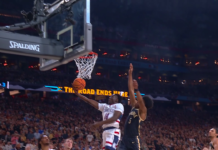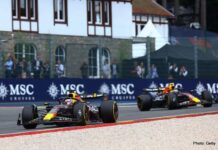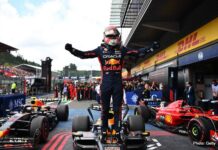
Former Formula 1 race director Michael Masi made a “human error” but acted in “good faith” during the controversial safety car restart at last season’s title-deciding Abu Dhabi Grand Prix, a report published by the Formula 1 governing body FIA today.
During the finale at Yas Marina in December, Masi allowed only the lapped cars between Max Verstappen and Lewis Hamilton to unlap themselves as he prepared to get the race restarted after a safety car period.
That gave the Dutchman the chance to pass Hamilton for the lead on the last lap which denied the Briton an unprecedented eighth title and sparked a backlash from fans and triggered ongoing inhumane hate at Masi.
“The process of identifying lapped cars has up until now been a manual one and human error lead to the fact that not all cars were allowed to unlap themselves,” said the report, the result of an investigation into the events in Abu Dhabi, which was presented at the FIA’s World Motor Sport Council ahead of the 2022 season-opening race in Bahrain.
In response, the FIA had developed software that will automatically inform lapped cars allowed to move back on to the lead lap that they may unlap themselves, the report said.
The wording of the regulations has also been clarified to say “all” lapped cars must unlap themselves, instead of “any” lapped cars that was previously in the rules.
The report also acknowledged that the rules governing a safety car restart were open to interpretation.
It said Masi was trying to allow for one final racing lap, in accordance with feedback from various stakeholders, including teams and drivers, expressing their preference for races ending under green flag conditions.
“In combination with the objective to finish under green flag racing conditions applied throughout the 2021 season, the report finds that the race director was acting in good faith and to the best of his knowledge given the difficult circumstances,” said the findings.
Masi was replaced as race director by Niels Wittich and Eduardo Freitas, who will alternate in the role, as part of an overhaul of the FIA’s refereeing system unveiled last month.
It also included the setting up of a virtual race control centre similar to football’s VAR.
The report fleshed out the working of the remote race control centre, which it said would be based in Geneva, and act as a “supporting resource” to the race direction team on site.
Full WMSC FIA Report
The World Motor Sport Council convened today for the first meeting of 2022. The meeting was chaired by FIA President Mohammed Ben Sulayem with FIA Deputy President for Sport Robert Reid and WMSC members joining in person and via video conference.
The event was staged in the Kingdom of Bahrain and hosted by his Royal Highness Salman Bin Hamad Al Khalifa and organised by Sheikh Abdulla Bin Isa Al Khalifa, the President of the Bahrain Motor Federation.
The following is a summary of the decisions taken during the meeting regarding the FIA Formula 1 World Championship
Findings of the analysis of the 2021 FIA Formula 1 Abu Dhabi Grand Prix presented to the World Motor Sport Council
A report was presented to the World Council in relation to the detailed analysis and clarification exercise that has been conducted in response to the events that took place at the 2021 FIA Formula 1 Abu Dhabi Grand Prix. The purpose of the detailed analysis and clarification exercise was to identify any lessons that can be learned from the events that took place and consider how best to provide clarity regarding the Formula 1 rules and regulations in order to preserve the competitive nature of the sport while ensuring the safety of both drivers and officials.
As part of the exercise, the Formula 1 Sporting Advisory Committee was instructed to consider the Formula 1 Sporting Regulations and key stakeholders were interviewed and consulted, including the Teams and Drivers, the Race Direction team, and the FIA staff supporting the race management team. The report sets out the findings, conclusions and recommendations arising from the detailed analysis and clarification exercise.
The report focused solely on the facts surrounding these events, and determined the following key points:
- The safety car procedure was a central topic of discussion during the detailed analysis and clarification exercise, stemming from the application of this procedure at the 2021 Abu Dhabi GP, pursuant to Articles 48.12 and 48.13 of the Formula 1 Sporting Regulations.
- The Race Director called the safety car back into the pit lane without it having completed an additional lap as required by the Formula 1 Sporting Regulations (Article 48.12).
- It was apparent from the analysis that there could be different interpretations of Article 48.12 and Article 48.13 of the Formula 1 Sporting Regulations, and that this likely contributed to the applied procedure.
- It was also considered that the decisions regarding the Safety Car at the end of the 2021 Abu Dhabi Grand Prix likely took into account previous discussions that made clear the Formula 1 Stakeholders (FIA, Formula 1, Teams and Drivers) preference to end races under green flag racing conditions, rather than behind a safety car, when safe to do so.
- In combination with the objective to finish under green flag racing conditions applied throughout the 2021 season, the report finds that the Race Director was acting in good faith and to the best of his knowledge given the difficult circumstances, particularly acknowledging the significant time constraints for decisions to be made and the immense pressure being applied by the teams.
- The results of the 2021 Abu Dhabi Grand Prix and the FIA Formula One World Championship are valid, final and cannot now be changed. In accordance with the rules, Mercedes made a protest to the stewards after the race, seeking to change the race classification. The stewards dismissed the protest and Mercedes then had an opportunity to appeal that decision to the FIA International Court of Appeal, but did not do so. There are no other available mechanisms in the rules for amending the race classification.
- The process of identifying lapped cars has up until now been a manual one and human error lead to the fact that not all cars were allowed to un-lap themselves. Due to the fact that manual interventions generally carry a higher risk of human error, software has been developed that will, from now on, automate the communication of the list of cars that must un-lap themselves. In addition, the 2022 Formula 1 Sporting Regulations have been recently updated to clarify that “all” and not “any” cars must be permitted to un-lap themselves.
- This process of identifying lapped cars has been reviewed as part of the recommendations previously announced by the FIA President in his statement of 17 February 2022, which also includes the creation of FIA Remote Operations Centre, the integration of a new and extended team to run trackside operations as well as a review of the interactions between teams and Race Control during track running.
The WMSC unanimously endorsed the contents of this report and the FIA will continue in its work to implement the recommendations identified as soon as possible.
Click here to view an Executive Summary of the Report.
Update on the implementation of Remote Operations Centre
The first phase of the Remote Operations Centre (ROC) – previously referred to as Virtual Race Control – is now online at the FIA Headquarters in Geneva. The Remote Operations Centre functions in the following capacity:
- Procedural and regulatory matters may be referred to the ROC, which operates in an advisory capacity and will not interrupt the workflow of the Race Direction team onsite or cause any delay to the decision-making process
- While similar in principle to the ‘VAR’ in football, the ROC will act as a supporting resource for the Race Direction team with data comparable to that of more than ten simultaneous football matches, including over 140 video and audio sources
- The ROC provides an additional resource for the FIA to thoroughly replay and review aspects of the Competition and the decisions made in order to refine and improve procedures for the future. It does not have any regulatory power and cannot be used to reassess or alter past decisions.
As the Remote Operations Centre is developed, it will become a valuable training and educational resource for of the next generation of Race Control staff and Stewards. Its benefits will later extend to other FIA Championships and the wider international community of FIA National Sporting Authorities (ASNs).
The following is a summary of some of the key updates to the Sporting and Technical Regulations, approved by the World Council earlier this week via e-vote:
- An update to the Sporting Regulation referring to the un-lapping procedures under Safety Car conditions to ensure that all lapped cars are permitted to un-lap themselves
- An update to the Technical Regulations permitting the use of a single floor stay on each side of the car
- An increase of the minimum mass by 3kg to 798kg













































